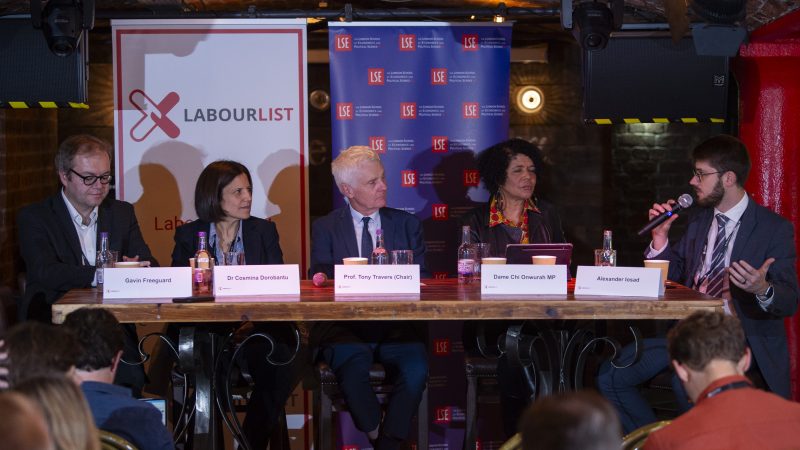
Artificial intelligence has the power to transform government policymaking, an expert panel said at the 2025 Labour party conference.
At the ‘Next-Gen Government: Data & AI in public service’ panel, hosted by LabourList in partnership with the London School of Economics (LSE), speakers outlined the huge potential of digital innovation while cautioning that internal barriers remain.
Dr Cosmina Dorobantu from the LSE Data Science Institute argued that AI offers a breakthrough for evidence-based policymaking.
“AI can be a game changer in improving policy decisions,” she said. “More than 52,000 policy decisions underpin how over a trillion pounds of public money gets spent each year.”
She explained that AI could succeed where traditional statistical models have failed. “We have a tremendous opportunity to adjust our economic models for a day and age in which citizens and companies generate massive amounts of data on a daily basis, and we have the technologies to put this data together.”
This, she said, could help policymakers answer questions they’d been asking for years, such as how to absorb excess capacity locally when a big company closes or how to best identify and fill local skill shortages.
However, the panel acknowledged the full-scale adoption of AI faces challenges both externally and internally.
Gavin Freeguard, a policy associate at Connected by Data, pointed to public wariness as a key issue. He admitted the public often sees AI as a “risky technology, rather than one that provides opportunities, and that is one of the great barriers to adoption.”
Subscribe here to our daily newsletter roundup of Labour news, analysis and comment– and follow us on Bluesky, WhatsApp, X and Facebook.
Dame Chi Onwurah MP, Chair of the Science, Innovation and Technology Select Committee, agreed that “technology is an opportunity to be embraced.” But she criticised the “total mess in a lot of legacy government systems,” referencing the 2022 data breach that exposed the details of 18,700 Afghans.
She also highlighted the opacity of government, recalling how she was previously unable to find out if government departments were overly dependent on tech giants like Microsoft and Amazon because “nobody knew what anybody was buying.”
This issue of misalignment was echoed by Gavin Freeguard. “The lack of interoperability between systems across different departments is a real problem.”
“A lot of the time it just adds barriers to building better services. I think one of the greatest barriers that we do have to be better at is we are terrible at learning lessons and sharing them, absolutely appalling.”
-
- SHARE: If you have anything to share that we should be looking into or publishing about this story – or any other topic involving Labour– contact us (strictly anonymously if you wish) at [email protected].
- SUBSCRIBE: Sign up to LabourList’s morning email here for the best briefing on everything Labour, every weekday morning.
- DONATE: If you value our work, please chip in a few pounds a week and become one of our supporters, helping sustain and expand our coverage.
- PARTNER: If you or your organisation might be interested in partnering with us on sponsored events or projects, email [email protected].
- ADVERTISE: If your organisation would like to advertise or run sponsored pieces on LabourList‘s daily newsletter or website, contact our exclusive ad partners Total Politics at [email protected].




More from LabourList
Government abandons plans to delay 30 local elections in England
‘The cost of living crisis is still Britain’s defining political challenge’
‘Nurses are finally getting the recognition they deserve’